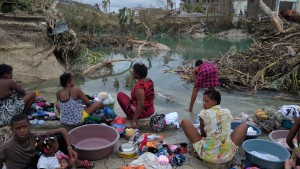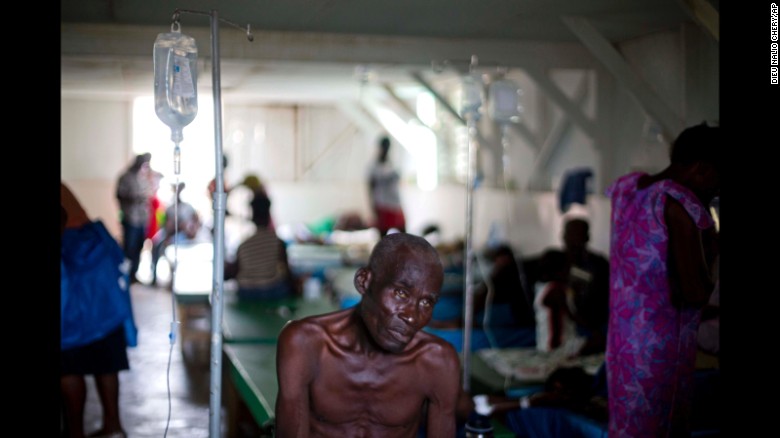Cholera fears rise in Haiti

Hurricane Matthew has left Haiti, but the danger is far from over as the number of cholera cases now is on the rise.
Haiti has been plagued with the waterborne disease since 2010 after UN soldiers accidentally brought it to the country in the aftermath of a major earthquake that year. The World Health Organization reported 80,000 cases in Haiti since the initial outbreak -- and 770 new cases per week in 2016.
Now the destruction brought by Matthew has accelerated the existing epidemic and undermined the strides made in fighting the disease, the country's leader said.
"A lot of effort has been made to avoid the spread of this epidemic," said Interim President Jocelerme Privert, "but the hurricane has accelerated it."
Cholera 'never left Haiti'
The Haitian Health Foundation also is worried about a potentially sharp increase in cholera cases. The disease is transmitted through the ingestion of contaminated water or food carrying Vibrio cholera bacteria. Infection leads to vomiting and diarrhea, which can kill within hours if left untreated.
Nadesha Mijoba, country director for the health foundation, said the aftermath of Hurricane Matthew will make new cases harder to detect and treat.
"Cholera never left Haiti. Cases have continued since the 2010 outbreak, but they have been manageable. With a disaster like Matthew, waters rise ... and people end up relying on polluted water sources ridden with human waste and feces, which can lead to an outbreak," Mijoba said.
Don't drink the water
In the devastated coastal city of Jeremie, CNN spoke to Angela Joseph, one of the several women trying to scrub their clothes clean in the potentially contaminated waters of the River Grande D'Anse, which flanks the city.
Hurricane Matthew created a huge storm surge that swept through the area, killing her chickens and goats and leaving her and her three children with nothing to eat.
"I haven't eaten all day," she told CNN's Ivan Watson, as she washed clothes in a plastic bin.
Now the threat of cholera has made access to drinking water a problem too.
"Some people came and told us not to drink water from the river because of cholera," Joseph said, adding that she would buy small plastic bags of drinking water when she could afford it.
At Jeremie's Saint-Antoine hospital, director Conception Panfilo told CNN that they had admitted 43 cholera patients.
Conditions at the hospital, which was badly damaged by the storm, were poor. More than 450 patients had arrived over the weekend, mostly people who had been wounded by flying debris during the storm, but the hospital had run out of anesthetics and antibiotics to treat them.
"We see a lot of helicopters and planes," Panfilo told CNN's Watson. "But we haven't gotten any aid."
Clean water a top priority
Health officials say that the top priority is to ensure that potable water is available to people in Haiti.
"Whatever technology available to treat water must reach us so that populations don't rely on bad sources. Antibiotic ointments and medicine to treat open wounds are also essential," said Mijoba.
The medical director of Haiti Air Ambulance, Dr. Vince DeGennaro, said there had been dozens of cholera deaths in the southwestern town of Port-a-Piment.
"These towns on the southwestern coast, it's near total destruction. Just about every building was knocked down, even concrete ones," he said. "It's quite frightening to see from the air."
"People are just sleeping outside and that leads to all sorts of problems with disease," he said.
In those conditions, he said, the threat of cholera was a "huge concern."
Save the Children has also seen a rise in cases following Hurricane Matthew.
"The number of cases is increasing with every new report," Dr. Unni Krishnan, director of Save the Children's Emergency Health Unit in Haiti, said in a statement.
"Flooding and contaminated water caused by the storm pose a huge threat to survivors, including thousands of children. Clean water and medicine delivered to the hardest hit areas in the next 24 to 48 hours are a key priority."
'Nobody has to die' from cholera
WHO spokesman Christian Lindmeier said an exact number of cholera cases across Haiti is hard to estimate. Some cases can be mild, but when treatment is not available, the loss of fluids through diarrhea and vomiting can lead to rapid dehydration and shock.
"Cholera is a disease nobody has to die from. Eighty percent of people infected will only show mild symptoms, and it can be easily treated if people are properly hydrated," Lindmeier said.
The WHO warns that rebuilding health facilities is also a priority. Once the rainy season reaches Haiti in November, cases of cholera could rise even more steeply.

Despite the rise in the reported cases, Mijoba is hopeful that Haiti is better prepared this time.
"There is more awareness about cholera in Haiti today. Medical teams are trained on how to treat and identify the problem. In 2010, the Haitian people did not know what to do," she said.
Other illnesses might start to pick up as well, especially as mosquito populations rise again.
"Mosquito populations will increase dramatically due to the water rising," Mijoba said.
"In normal circumstances, dengue and malaria are already a problem, so the incidence of these diseases is likely to worsen."

Post a Comment